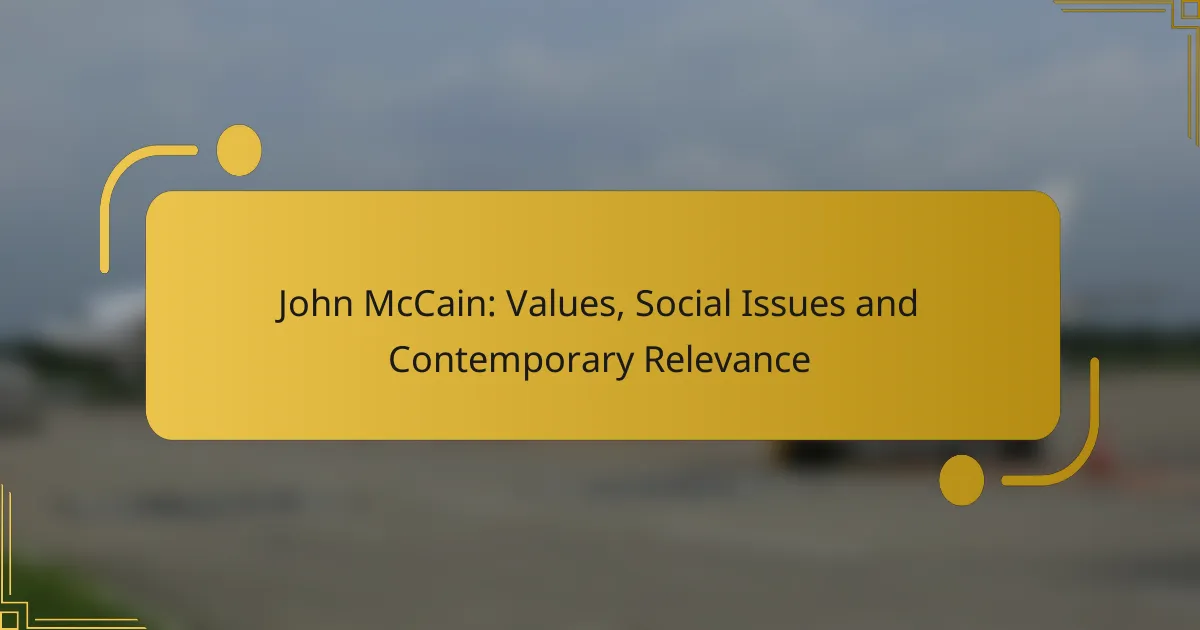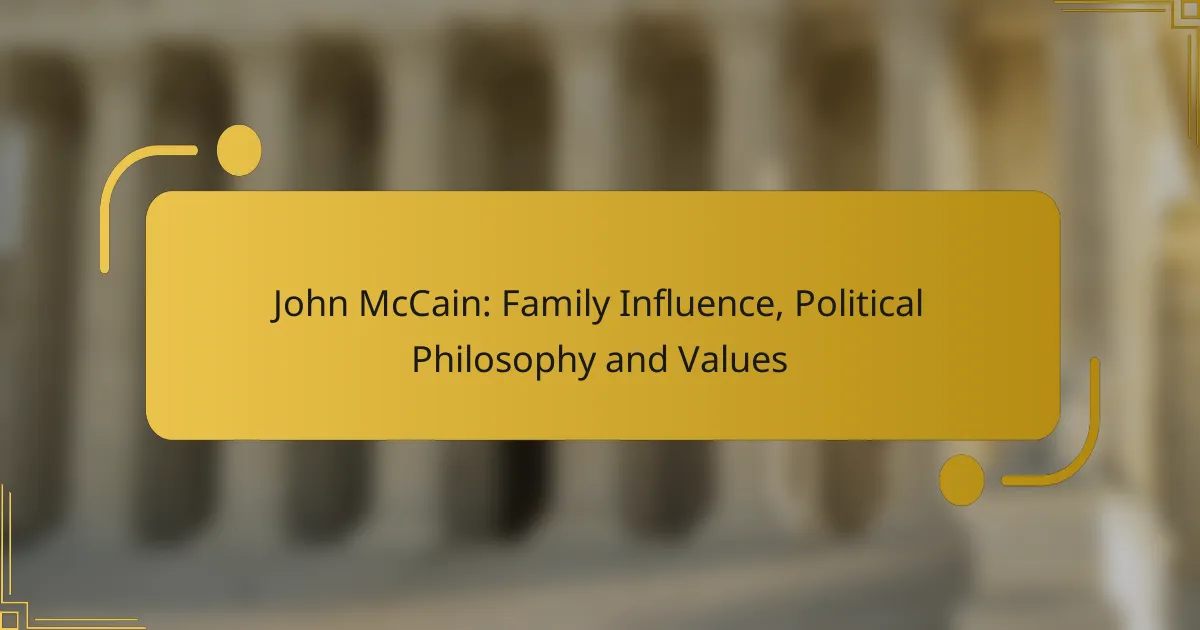John McCain was a prominent figure in American politics, known for his unwavering commitment to values such as patriotism, bipartisanship, and human rights advocacy. His influence extended to critical social issues like healthcare and [censured] rights, where he balanced conservative principles with progressive reforms. Today, McCain’s legacy remains relevant, particularly in discussions surrounding integrity and governance within the Republican Party and beyond.

What values did John McCain champion?
John McCain championed values such as patriotism, bipartisanship, human rights advocacy, and integrity. These principles guided his political career and shaped his approach to governance, making him a significant figure in contemporary American politics.
Patriotism and service
McCain’s deep sense of patriotism was rooted in his military service and his belief in the American ideals of freedom and democracy. He often emphasized the importance of serving one’s country, whether through military service or civic engagement.
His experiences as a prisoner of war in Vietnam further solidified his commitment to the nation, inspiring him to advocate for veterans’ rights and support military families. McCain believed that true patriotism involved not just love for one’s country but also a responsibility to improve it.
Bipartisanship and compromise
McCain was known for his willingness to work across party lines, believing that effective governance required collaboration and compromise. He often sought to bridge divides, advocating for policies that benefited the nation rather than adhering strictly to party ideology.
This approach was evident in his support for immigration reform and campaign finance reform, where he often partnered with members of the opposing party to achieve meaningful change. McCain’s legacy includes a call for civility in political discourse, urging leaders to prioritize the common good over partisan interests.
Human rights advocacy
Throughout his career, McCain was a staunch advocate for human rights, both domestically and internationally. He believed in the importance of promoting democracy and freedom, often speaking out against authoritarian regimes and human rights abuses.
His commitment to human rights was reflected in his support for various international initiatives and humanitarian efforts, including advocating for the rights of political prisoners and marginalized groups. McCain’s stance highlighted the belief that American values should extend beyond borders.
Integrity and honesty
Integrity and honesty were cornerstones of McCain’s political philosophy. He was known for his straightforwardness and willingness to speak the truth, even when it was politically inconvenient. This earned him respect from both supporters and opponents.
McCain often emphasized the importance of accountability in government, advocating for transparency and ethical conduct among public officials. His commitment to integrity served as a model for aspiring politicians, reinforcing the idea that trust is essential in public service.
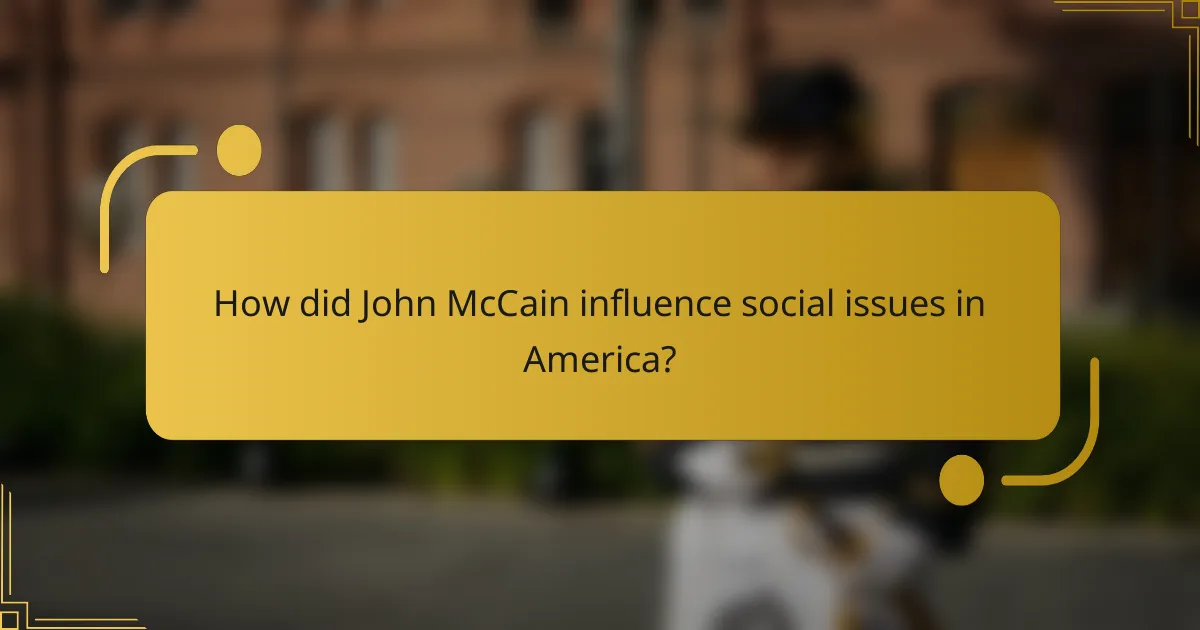
How did John McCain influence social issues in America?
John McCain significantly influenced social issues in America through his bipartisan approach and advocacy for various reforms. His positions on healthcare, immigration, and [censured] rights shaped national discourse and policy, reflecting a commitment to both conservative principles and progressive change.
Healthcare reform initiatives
John McCain played a pivotal role in healthcare reform, particularly during the debates surrounding the Affordable Care Act (ACA). He famously voted against the repeal of the ACA in 2017, emphasizing the need for a more thoughtful approach to healthcare that considers the needs of millions of Americans.
His advocacy for bipartisan solutions led to discussions on improving healthcare access and affordability. McCain’s focus on veterans’ healthcare also highlighted the importance of providing quality medical services to those who served the country.
Support for immigration reform
McCain was a strong proponent of comprehensive immigration reform, advocating for a pathway to citizenship for undocumented immigrants. He believed that reform should balance border security with humane treatment of individuals seeking a better life in the U.S.
His involvement in the “Gang of Eight” in 2013 aimed to create a bipartisan immigration bill that addressed various aspects of the immigration system, reflecting his belief in the necessity of reform to support economic growth and family unity.
Stance on [censured] rights
John McCain’s stance on [censured] rights evolved over time, ultimately supporting key issues such as the repeal of “Don’t Ask, Don’t Tell.” He recognized the importance of allowing [censured] individuals to serve openly in the military, which marked a significant shift in military policy.
While he initially opposed same-sex marriage, McCain later acknowledged the changing societal views and the importance of equality. His journey reflected a broader trend within the Republican Party, highlighting the ongoing dialogue around [censured] rights in America.
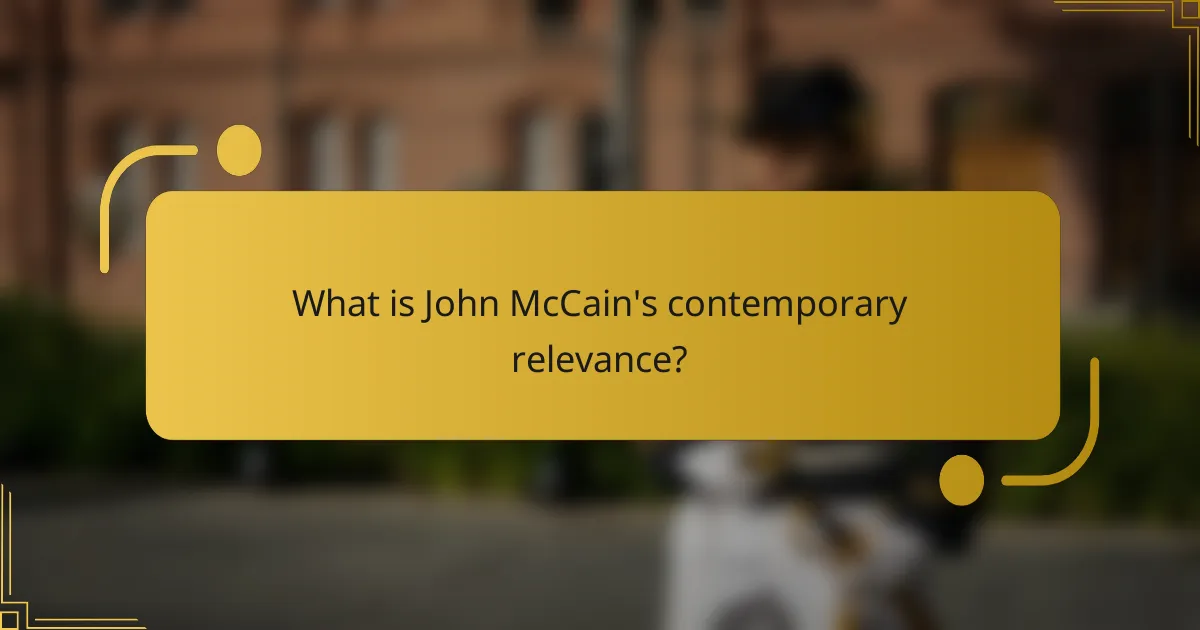
What is John McCain’s contemporary relevance?
John McCain’s contemporary relevance lies in his enduring influence on American politics, particularly within the Republican Party, and his approach to foreign policy and political discourse. His values of bipartisanship and integrity continue to resonate, shaping discussions on governance and civic responsibility.
Impact on modern Republican Party
John McCain significantly shaped the modern Republican Party by advocating for principles such as integrity, service, and a commitment to national security. His willingness to cross party lines on issues like immigration reform and healthcare highlighted a more moderate approach that appealed to a broader electorate.
Despite the rise of more extreme factions within the party, McCain’s legacy encourages a return to traditional Republican values, emphasizing the importance of character and principled leadership. His influence can be seen in ongoing debates about the party’s identity and direction.
Legacy in U.S. foreign policy
McCain’s legacy in U.S. foreign policy is marked by his strong advocacy for a robust international presence and support for democratic movements worldwide. He championed the importance of alliances, particularly NATO, and was a vocal critic of isolationism, arguing that American leadership is crucial for global stability.
His approach to foreign policy emphasized the need for moral clarity and the promotion of human rights, which continues to inform discussions on America’s role in international affairs. McCain’s perspective remains relevant as policymakers navigate complex global challenges.
Influence on political discourse
John McCain’s influence on political discourse is evident in his commitment to civility and respect, even towards political opponents. He often emphasized the importance of dialogue and compromise, advocating for a political culture that prioritizes understanding over division.
His ability to engage with diverse viewpoints and his rejection of vitriol set a standard for political engagement that many seek to emulate. In an era of heightened partisanship, McCain’s legacy serves as a reminder of the value of constructive conversation in achieving meaningful progress.
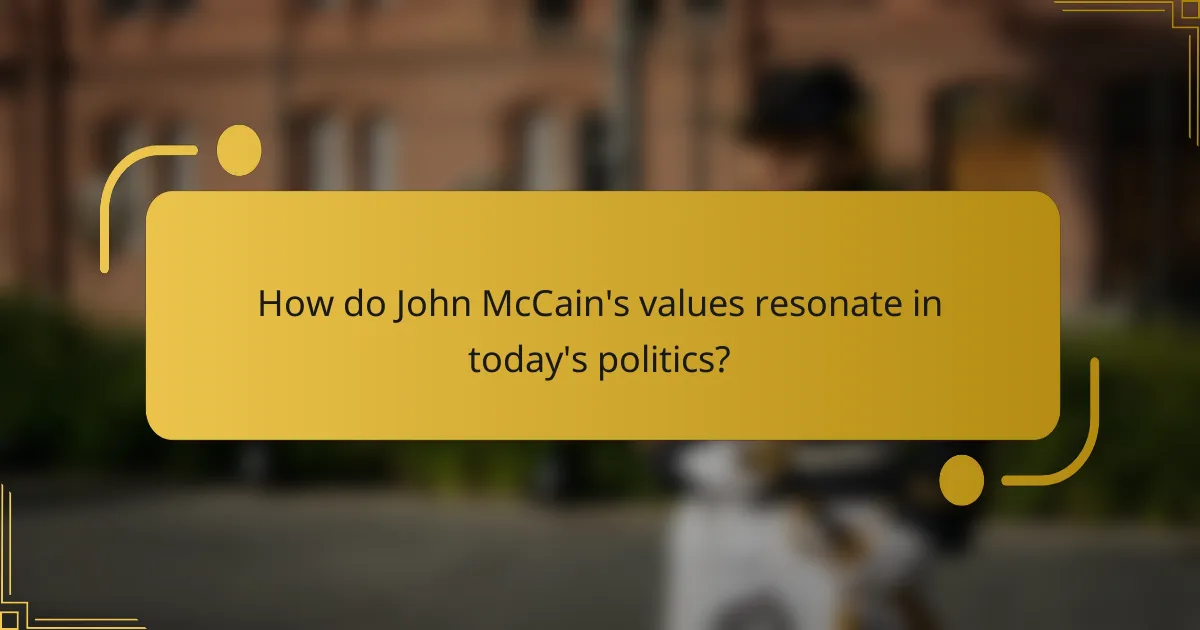
How do John McCain’s values resonate in today’s politics?
John McCain’s values, particularly his commitment to bipartisanship, integrity, and national service, continue to influence contemporary politics. His approach to governance emphasizes collaboration across party lines and prioritizing the nation’s interests over partisan agendas, which remains relevant in today’s polarized political climate.
Comparison with current political leaders
Many current political leaders exhibit a stark contrast to McCain’s values, often prioritizing party loyalty over collaboration. While some leaders advocate for divisive rhetoric, McCain’s legacy encourages a more unifying approach, appealing to a broad spectrum of voters. For example, leaders who focus on compromise and dialogue may find greater success in bridging divides, similar to McCain’s tenure.
However, a few contemporary figures, such as Mitt Romney and Joe Manchin, embody McCain’s spirit of bipartisanship, often seeking to work across party lines on key issues. Their willingness to engage with opposing viewpoints reflects McCain’s influence and highlights the ongoing need for cooperation in governance.
Public perception of his legacy
Public perception of John McCain’s legacy is largely positive, with many viewing him as a symbol of integrity and principled leadership. His willingness to stand up against his party when he believed it was necessary has earned him respect across the political spectrum. Polls indicate that a significant portion of Americans admire his commitment to service and his ability to engage in civil discourse.
Despite this admiration, some critics argue that his policies, particularly in foreign affairs, may not align with current public sentiment. Nevertheless, McCain’s emphasis on character and service continues to resonate, inspiring new generations of leaders to prioritize ethical governance and civic responsibility.
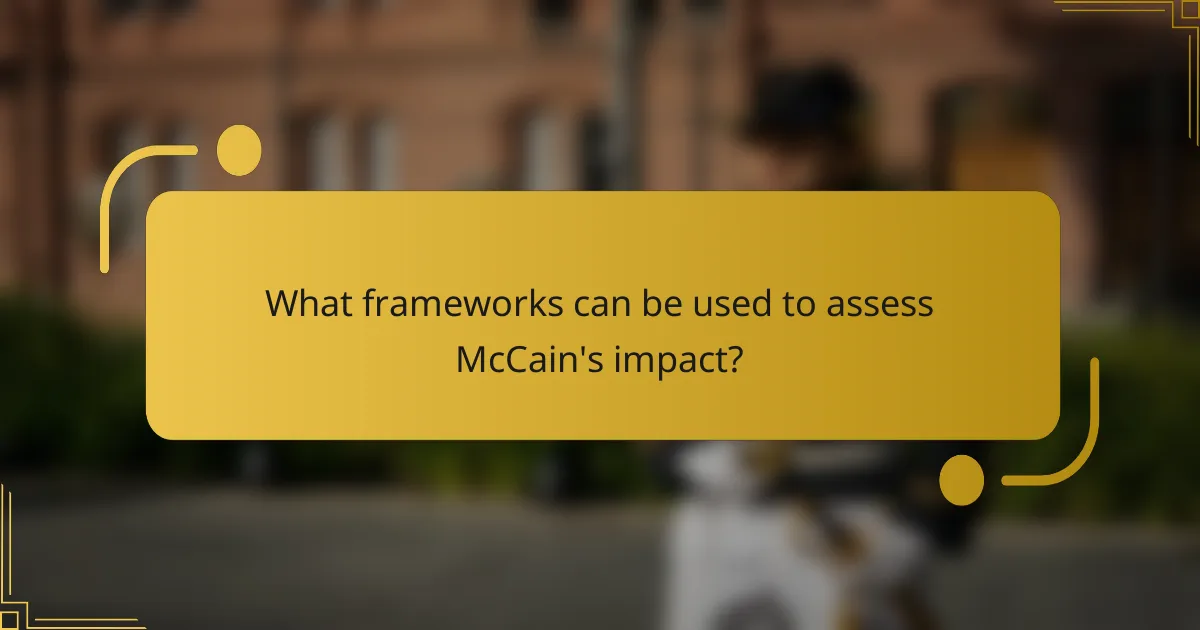
What frameworks can be used to assess McCain’s impact?
To assess John McCain’s impact, one can utilize frameworks that focus on political legacy and social issues. These frameworks help in understanding his contributions, values, and relevance in contemporary society.
Political legacy analysis
Political legacy analysis examines the long-term effects of McCain’s policies and actions on American politics. Key factors include his bipartisan efforts, stance on military intervention, and advocacy for campaign finance reform. Evaluating these aspects reveals how they shaped party dynamics and public opinion.
For instance, McCain’s commitment to a strong national defense and his role in the Senate influenced military policy debates. His willingness to cross party lines on issues like immigration reform showcases his approach to governance and collaboration.
Social issue evaluation criteria
Social issue evaluation criteria focus on McCain’s positions on key societal topics such as healthcare, immigration, and veterans’ affairs. Assessing his viewpoints involves analyzing his legislative actions and public statements to understand their societal implications.
For example, McCain’s support for the Affordable Care Act’s repeal reflects his views on healthcare reform, while his advocacy for comprehensive immigration reform highlights his approach to social integration. Evaluating these issues provides insight into his values and their relevance in today’s political landscape.
